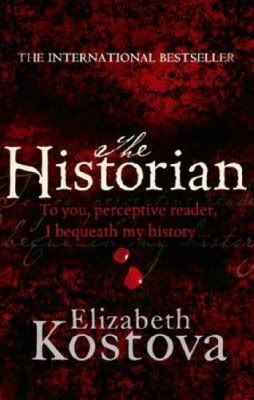 (2005)
(2005)Genre: Historical Fiction/Gothic
Synopsis: Late one night, exploring her father's library, a young woman finds an ancient book and a cache of yellowing letters addressed ominously to 'My dear and unfortunate successor'. Her discovery plunges her into a world she never dreamed of - a labyrinth where the secrets of her father's past and her mother's mysterious fate connect to an evil hidden in the depths of history. In those few quiet moments, she unwittingly assumes a quest she will discover is her birthright - a hunt for the truth about Vlad the Impaler, the medieval ruler whose barbarous reign formed the basis of the Dracula myth in a captivating tale that blends fact and fantasy.
***
Review: The book starts off wonderfully. Probably the most unlikely element of the writing was the fact that it was being told largely by a man and the writing was a bit too flowery for that, but that doesn't affect the novel. The langauge is superb, there is a distinctly eastern atmosphere and almost immediately an air of the supernatural is involved. One of the biggest challenges for this book was always going to be how involved the supernatural element would be - real vampires have to be supernatural, but everything else about the book is so firmly rooted in history that smoothing the lines to make it a credible read was always going to be tough. For the most part, Kostova succeeds. In fact arguably the only time at which she fails is when she blurs the lines so much that you don't notice when it becomes an accepted fact by the characters that vampires are real. Conversely, also, once you get to the point of believeing, even assuming, that the vampires are real, the supernatural element seems to become less threatening. It's accepted at face value to the extent that the supernatural becomes as atmospheric as a typical vampire relative to Buffy The Vampire Slayer. Read as: not very.
Ultimately, this leads to the most difficult task of all: the portrayal of the historian, Dracula, himself. Several accounts I've read were disappointed by his portrayal, and I also felt the ending was rushed, undeveloped, ill-portrayed and unsatisfying, simply because of the high standard the book to that point had raised. However, on reflection, the high standard was never of character development. It was of historical facts. Dracula was perhaps just a little crushed under the weight of his own history, laid out in several hundred pages prior to his appearance. With regard to other characters, although the revelation of identities is quite obvious a couple hundred pages earlier, the reunion at the end of all the characters is stiff and unconvincing. The end of the father's story and the beginning of the daughter's story, the connection between which is realised at this point - don't really fit together too well. What the author tried to do was potentially great, but certain characters I think were not strong enough to carry it. Most had not developed into anything definitive beyond a researcher prone to the most convenient coincidences, and none had any real depth. What it comes down to in the end, I think, is that Kostova seemed to put her research first, her characters second, and the actual story third. This means that the research is deep and comprehensive throughout, to the point of dwarfing the characters. When the characters, including Dracula come to the forefront, they are lost amidst underdevelopment. And lastly, the plot holding these characters in place, beyond their research, is somewhat unbelieveable to say the least.
None of this is to say that I disliked the book however - I think you just need to know what to expect. For anything I could criticize in the book, the most defining aspect - the historical research (which most certainly carries the entire plot and and structuring of the book) - is flawless and sets it apart not only from other books which suffer poor characterisation and plots ANYWAY, but also within it's own genre. It's an entirely new, historical look at vampires. So, I think the book will suit fans of historical fiction, and of Vlad Dracula, more than anything - MERE vampire fans will probably struggle through this as it is by no means like Twilight or Dracula. It doesn't really even fit onto the same spectrum, despite it's connection with Dracula. It's not a vampire book, it's a history book with a little bit of vampire thrown in. Even if the book was 300 pages shorter to accommodate those who couldn't stand the drawn-out accounts of, well, everything, I'm certain they wouldn't like it any more than at 700 pages, as for it to have been in any way historically coherent it would have been extremely condensed. All in all, average as plot and characters go, but it excels in it's key element - well worth one read if history is your thing.
Rating: 4/5
No comments:
Post a Comment